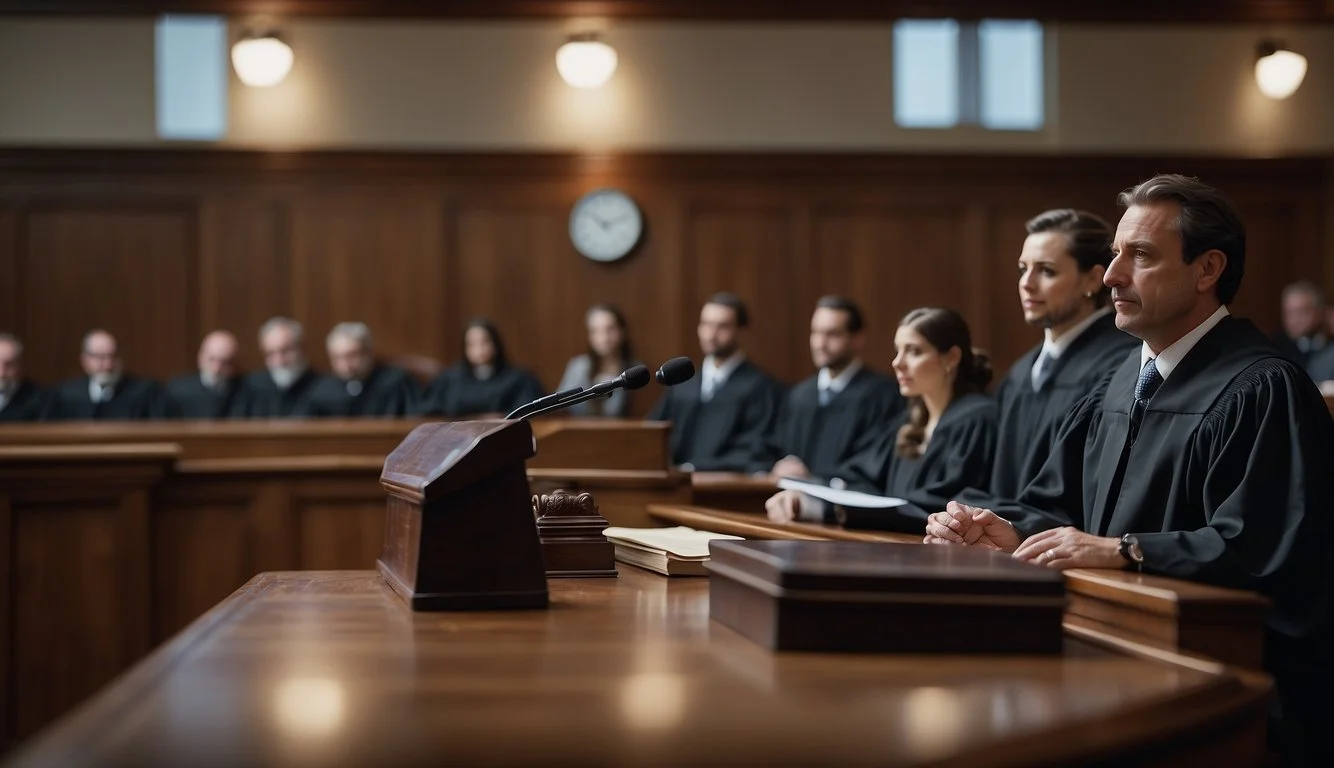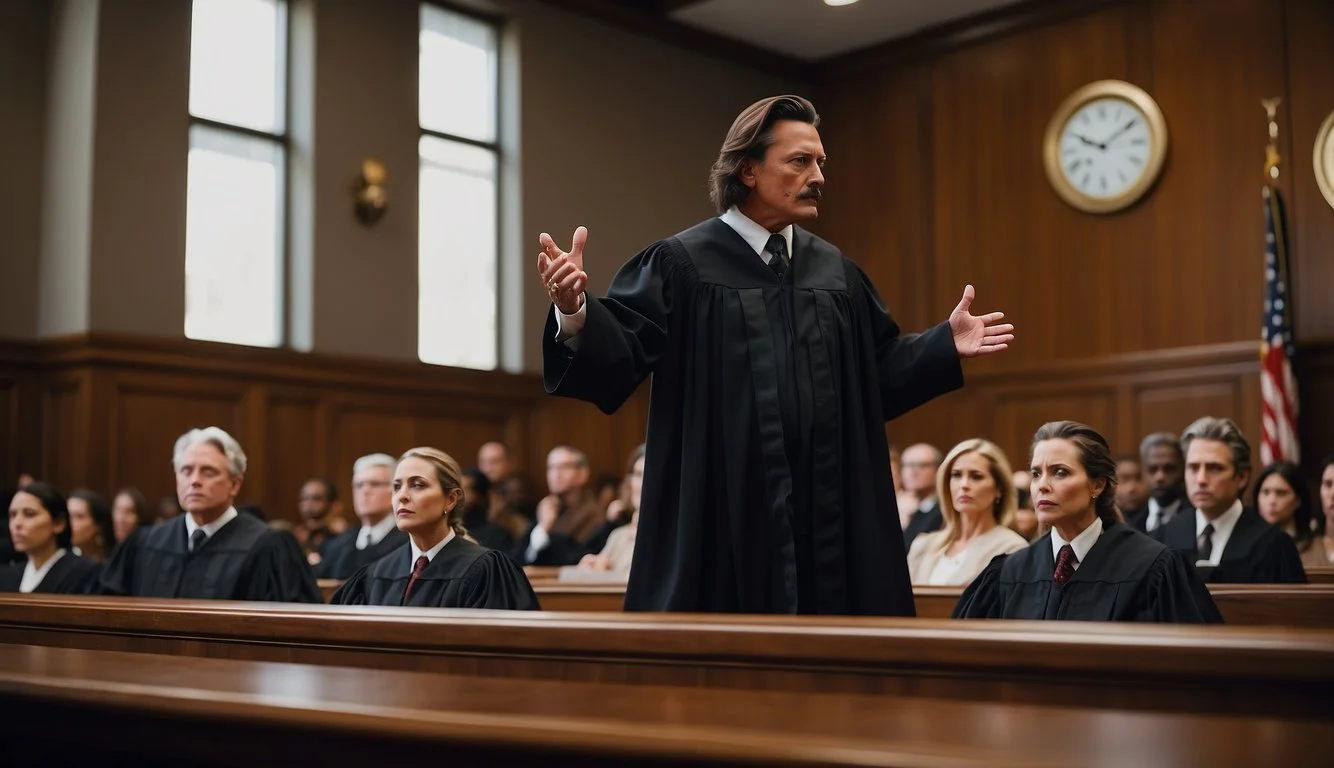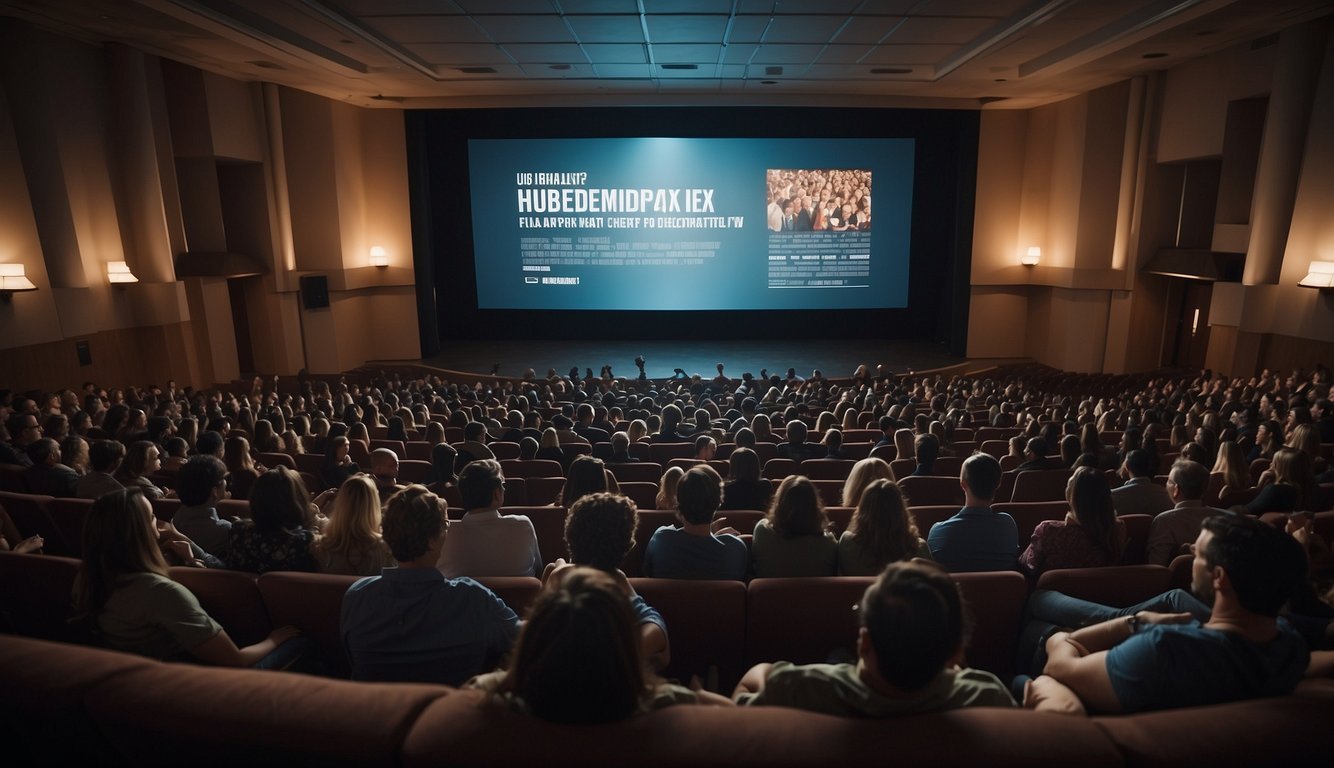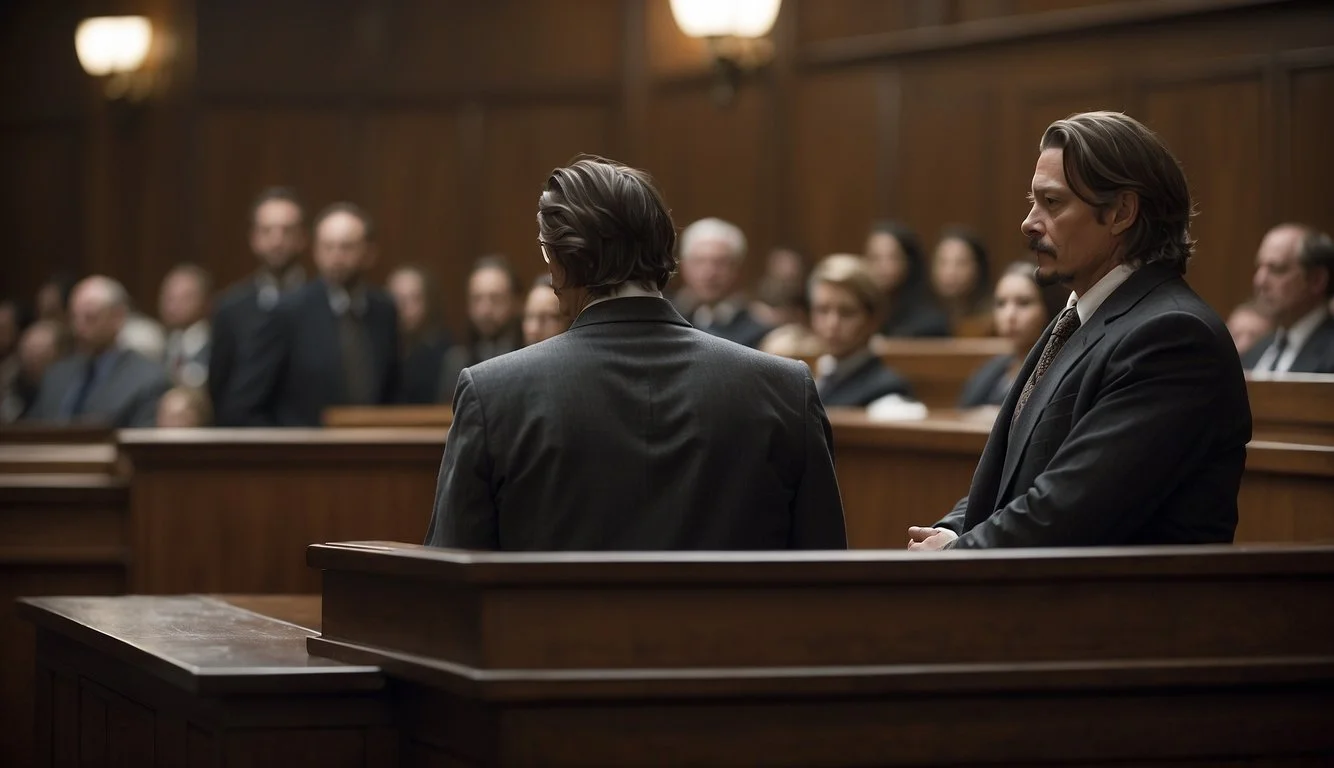Documentary Review: Depp V Heard (2023)
A Comprehensive Analysis
The 2023 documentary series "Depp V Heard" dissects the highly publicized defamation trial between Johnny Depp and Amber Heard. This three-part series, directed by Emma Cooper, explores both sides of the testimonies, presenting them in a side-by-side format for the first time. Available on Netflix after its initial airing on Channel 4 in the UK, it aims to shed light on the intricacies and media frenzy surrounding the case.
Emma Cooper's series stands out for its unique presentation of courtroom footage and online reactions, offering viewers a comprehensive look at how the trial captivated global audiences. Featuring testimonies from both Depp and Heard, it attempts to unravel the complexities behind their legal battle and the subsequent public discourse.
By juxtaposing personal narratives with the trial's broader societal impact, "Depp V Heard" paints a vivid picture of a case that not only challenged the reputations of its participants but also sparked widespread debate on issues of credibility and justice within the entertainment industry.
Overview of the Documentary
"Depp V. Heard" is a 2023 Netflix documentary series that delves into the high-profile defamation trial between Johnny Depp and Amber Heard. This overview provides insights into its production, synopsis, and the key themes.
Production Background
Directed by Emma Cooper, "Depp V. Heard" is a three-part documentary series. Initially aired on Channel 4 in the United Kingdom in May 2023, the series was later released internationally on Netflix. The production's timing, arriving over a year after the trial concluded, signifies a thorough compilation and analysis of extensive court footage, testimonies, and media reactions.
Synopsis
The docuseries explores the events surrounding the 2022 defamation trial where Johnny Depp sued Amber Heard over an opinion article she wrote. The series focuses on combining courtroom testimonies, witness statements, and media clips. It offers viewers a chronological narrative of the courtroom drama, highlighting the significant moments that captured global attention during the trial.
Key Themes and Messages
The documentary emphasizes multiple themes:
Media Influence: It highlights how media coverage shaped public perception and the online fallout post-trial.
Celebrity Culture: The series scrutinizes the intersection of celebrity life and legal battles.
Justice System: Attention is given to the workings of the judicial process in high-profile cases, raising questions about fairness and bias.
Gender Dynamics: Examines the roles and portrayals of gender within the context of legal disputes and public opinion.
Profile of the Legal Drama
The legal drama between Johnny Depp and Amber Heard captivated audiences globally. It revolved around defamation allegations, a widely publicized trial, and significant media attention.
The Lawsuits
Johnny Depp filed a defamation lawsuit against Amber Heard in March 2019. He claimed her Washington Post op-ed, implying she was a victim of domestic abuse, damaged his career. Depp sought $50 million in damages.
Amber Heard countersued Depp for $100 million in August 2020, claiming his legal team's statements calling her accusations a hoax defamed her. Both lawsuits included extensive evidence and numerous witness testimonies, making the case complex and highly publicized.
Timeline of Events
March 2019: Depp files defamation lawsuit.
August 2020: Heard countersues for defamation.
April 2022 - June 2022: The trial is held in Fairfax County, Virginia.
June 1, 2022: The jury delivers its verdict, largely favoring Depp but awarding some damages to Heard as well.
The trial highlighted various incidents, including confrontations on private planes and heated arguments. Over six weeks, it garnered massive media coverage, reflecting public fascination with celebrity legal battles.
Main Allegations
Depp alleged Heard falsely accused him of abuse to advance her career, severely damaging his reputation and career opportunities. His team presented evidence, including recordings and witness testimonies, indicating possible fabrication of abuse claims.
Heard accused Depp of physical and emotional abuse during their tumultuous relationship. She presented graphic descriptions of alleged violence, backed by photos and texts. Both parties’ legal teams focused on discrediting the opposing side, creating a dramatic courtroom atmosphere.
The jury's mixed verdict underscored the complex nature of the case, recognizing harm to both parties’ reputations.
Analysis of the Documentary Style
The "Depp v Heard" documentary utilizes various narrative techniques, distinctive cinematography, deliberate editing and pacing, and a range of interview segments to present its content effectively.
Narrative Techniques
The documentary adopts a linear narrative, following the sequence of events as they unfolded during the trial. This approach helps viewers track the progression without confusion. Flashbacks are interspersed to provide context, grounding the current events in past occurrences. The series uses direct quotes from the trial, adding authenticity and ensuring that the words of the individuals involved are accurately represented.
Cinematography
The cinematography in "Depp v Heard" is notable for its mix of courtroom footage and dramatized reconstructions. The use of close-ups allows viewers to capture the emotional nuances of the participants. Static shots of the courtroom contrast with dynamic, handheld camera movements used in reenactments. The lighting is meticulously controlled to maintain a somber and serious tone, reflecting the gravity of the situation.
Editing and Pacing
Editing in the documentary emphasizes dramatic moments of testimony, enhancing engagement. The pacing is deliberate, often lingering on key testimonies to allow viewers to absorb their significance. Time lapses between different days of the trial are seamlessly bridged using judicial-themed transitions. This careful pacing ensures that the audience remains invested without feeling overwhelmed.
Interviews and Commentaries
"Depp v Heard" includes interviews with legal experts, witnesses, and commentators who provide insights into the trial. Their commentary offers diverse perspectives, adding depth to the narrative. Each interview is succinctly edited to focus on the most relevant points, ensuring clarity. By balancing direct, factual statements with expert opinions, the series delivers a comprehensive view without unnecessary repetition.
Critical Reception
The documentary "Depp V Heard" has provoked varied reactions from critics, audiences, and the public.
Film Critic Reviews
Critics have offered mixed reviews on "Depp V Heard." Some praised the documentary's meticulous assembly of courtroom footage, while others criticized its failure to provide new insights or a unique perspective. For instance, Pallavi Keswani of The Hindu noted its lack of expert viewpoints, describing the series as a weak attempt at self-reflection. The documentary's structure and presentation style, which juxtaposes testimonies side-by-side, received both commendation and critique. Critics generally agreed that it heightened public intrigue but did not necessarily deepen the understanding of the trial's complexities.
Audience Response
Audience reception has mirrored the polarizing nature of the trial itself. Viewers appreciated the documentary for its thorough documentation and the raw portrayal of testimonies. Some found it enlightening, providing a full picture of the proceedings that was previously fragmented through media snippets. However, there were also criticisms regarding bias and the lack of conclusive commentary. The emotional investment of the viewers was evident in the varied and passionate responses that flooded social media platforms, reflecting both support and disdain for the parties involved.
Impact on Public Opinion
The documentary significantly influenced public opinion on the Depp-Heard trial. By compiling court footage and testimonies, it reignited discussions and debates about the case. This renewed focus not only highlighted existing divides but also contributed to shaping newer narratives. Viewers who watched the series often found their pre-existing notions either challenged or reinforced. The documentary's release on international platforms like Netflix expanded its reach, making it a focal point for global dialogue on issues of defamation, celebrity culture, and media representation.
Ethical Considerations
The documentary "Depp v. Heard" touches on sensitive issues, raising questions about how participants are portrayed, their privacy and consent, and the balancing act between storytelling and factual accuracy.
Portrayal of Participants
The documentary must carefully depict both Johnny Depp and Amber Heard. Ensuring a balanced portrayal is crucial, especially considering the public scrutiny both parties have faced.
Editing choices, such as which testimonies to highlight and what background information to include, can significantly impact public perception. Misrepresentation or selective framing can lead to further harm and misinform the audience.
Privacy and Consent
Privacy and consent are paramount in such high-profile cases. Both Depp and Heard's personal lives were exposed during the trial, and the documentary must navigate respecting their privacy while providing necessary context.
Footage and testimonies used must align with consent given by the subjects. Breaching this can lead to legal ramifications and ethical questions about exploiting personal distress for viewership.
Balancing Storytelling with Facts
Documentaries aim to tell a compelling story, but this must not come at the expense of accuracy. "Depp v. Heard" needs to balance narrative elements with rigorous fact-checking to avoid misleading viewers.
Incorporating expert opinions and verified data ensures that the documentary is informative while engaging. Highlighting factual testimony over sensationalism helps maintain credibility and trustworthiness.
Cultural and Societal Impact
"Depp v. Heard" has rippled through media and culture, creating debates about truth, celebrity influence, and the dynamics of public opinion. This section breaks down these critical impacts.
Influence on Media
The release of "Depp v. Heard" has reshaped media conversations, highlighting the role documentaries play in revisiting high-profile legal battles. Media outlets have dissected the series, scrutinizing its portrayal of the participants and its broader implications.
The documentary has spurred discussions about how media influences public perception, especially in cases involving celebrities. Various platforms, from news sites to podcasts, have explored the trial's intricate details, emphasizing the importance of responsible reporting.
Public discourse often shifts when celebrity trials are presented in this medium, underlining the potent mix of entertainment and real-life stakes. This blend has proven powerful, drawing significant attention and engagement from diverse audiences.
Conclusion
The three-part documentary series Depp V Heard on Netflix delves into the 2022 defamation trial between Johnny Depp and Amber Heard. Directed by Emma Cooper, the series aims to present a balanced view by compiling testimonies from both parties along with other witnesses.
The documentary highlights the intense media coverage and public interest that accompanied the trial. This series underscores the complexities involved in high-profile legal battles where personal lives are scrutinized.
Despite efforts to create an unbiased narrative, the series has received mixed reviews. Some critics argue that it leans too heavily on the dramatic elements of the case rather than providing a clear, factual analysis.
The documentary was first aired on Channel 4 in the UK and later made available internationally on Netflix, offering a comprehensive recount of the trial proceedings to a global audience.
Pros:
Extensive use of trial footage
Includes a variety of perspectives
Cons:
Perceived lack of depth in analysis
Mixed reception from critics and viewers
In Depp V Heard, Emma Cooper attempts to capture the multifaceted nature of the defamation case. The documentary serves as a reflection of how legal matters intersect with public perception and media narratives.





